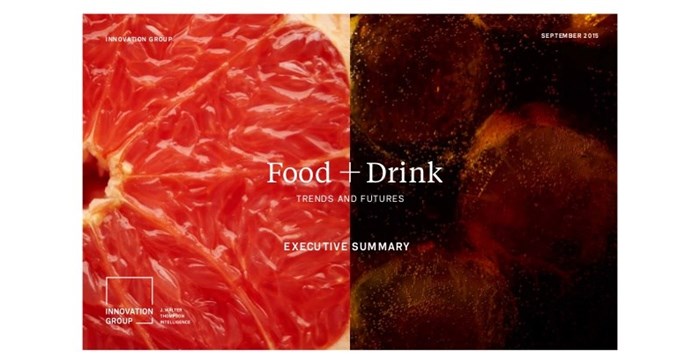The Innovation Group, the innovation and futurism unit of J. Walter Thompson Intelligence, has revealed the future of food and drink in its latest trend report.
As the pace of innovation in food and drink accelerates - driven by digital media, advances in technology and a newly politicised awareness of food among consumers - the report offers a snapshot of today's innovations and what they reveal about the food and drink consumers of the future.
"Today's food and drink consumers are more sophisticated than ever before," said Lucie Greene, Worldwide Director of the Innovation Group. "Our research shows that both US and UK consumers are placing increasing importance on food and drink as an experiential luxury and reflection of their personal identity. We also found that millennials, despite their well-documented economic challenges, are demanding higher-quality food, visual stimulation, and technologically enhanced experiences."
The report includes a statistical introduction based on original data from Sonar, J. Walter Thompson's proprietary research unit.
Original data highlights include:
- Seventy-four percent of US millennials and 58% of UK millennials believe that marijuana will become as socially acceptable as alcohol over the next decade;
- Foodie culture has gone mainstream as it becomes an increasingly important part of personal identity. Four out of five US millennials say that they consider going out to eat to be a cultural experience;
- Ethnically minded consumers want ethnically minded brands. Ninety-three percent of US millennials and 79% of UK millennials would support food brands that help society become healthier;
- Seventy-two percent of US and UK millennials are more likely to purchase gourmet or high-quality food today than they were several years ago;
- Seventy-two percent of US and UK millennials are more likely to share pictures of food and drink if it is different or unique, versus only 22% of boomers;
- More than half of US and UK millennials use technology like apps and wearables to maintain a healthy diet; and
- Sixty-two percent of UK millennials agree that online food delivery services have made meal preparation much easier for them, versus only 21% of Boomers.
The report also features qualitative reporting that delves into the latest future-facing food and drink trends, as well as case studies of the best food and drink innovations.
Key trends include:
Food:
- Flexitarians, the new omnivores: Plant-based products are becoming indistinguishable from meat, while small-scale meat producers increasingly market their wares to vegetarians. We are all 'flexitarians' now;
- Delivery futures: Ordering takeaway on smartphones is old news - get ready for curated delivery, delivery-only restaurants and even zero-cost delivery by self-driving car;
- Fat is back: Discourse around fat is changing. Far from being off the menu, it's back and is being positively encouraged by brands and chefs in new products and ingredients; and
- Food porn is the new norm: Awash in food imagery on social media, consumers are gravitating towards surprising and compelling images that aim more for the mind than the stomach.
Drink:
- Cannabis connoisseurs: A wave of marijuana legalisation in the US has freed beverage start-ups to experiment with THC infusions, as well as non-intoxicating hemp concoctions. The majority of consumers surveyed across millennials, Gen X and Boomer generations agree that marijuana will be as socially acceptable as alcohol over the next decade;
- Health meets hedonism: Health-conscious millennials are having their cake and eating it too when it comes to alcohol, gravitating toward healthier mixers and mashing up exercise with hedonism;
- Not your mother's Tom Collins: The cloying cocktails of the 1970s and 80s were long considered passé, but they are making a comeback as mixologists reinvent them for sophisticated, modern palates; and
- Virtual sensoria: Experiential marketing for beverages is becoming more immersive as drink brands dip their toes into virtual reality storytelling.
For this report, the Innovation Group conducted quantitative studies using Sonar, J. Walter Thompson's proprietary research unit, which develops and exploits new research techniques to understand cultures, brands and consumer motivation. A total of 1,003 US and UK individuals were surveyed in July 2015.
For more: The Innovation Group launches Food + Drink report






















